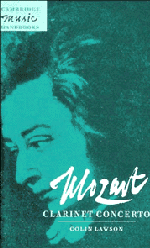Book contents
- Frontmatter
- Contents
- List of illustrations
- Preface
- 1 The eighteenth-century clarinet and its music
- 2 Mozart, Stadler and the clarinet
- 3 The genesis and reception of the Concerto
- 4 Stadler's clarinet and its revival
- 5 Mozart's original text
- 6 Design and structure
- 7 Performance practice
- Appendix 1 A review of the Breitkopf and Härtel edition in the Leipzig Allgemeine Musikalische Zeitung, 4 (March 1802)
- Appendix 2 Surviving instruments
- Appendix 3 A list of works composed by Mozart's clarinettist, Anton Stadler
- Notes
- Select bibliography
- Index
Preface
Published online by Cambridge University Press: 05 June 2012
- Frontmatter
- Contents
- List of illustrations
- Preface
- 1 The eighteenth-century clarinet and its music
- 2 Mozart, Stadler and the clarinet
- 3 The genesis and reception of the Concerto
- 4 Stadler's clarinet and its revival
- 5 Mozart's original text
- 6 Design and structure
- 7 Performance practice
- Appendix 1 A review of the Breitkopf and Härtel edition in the Leipzig Allgemeine Musikalische Zeitung, 4 (March 1802)
- Appendix 2 Surviving instruments
- Appendix 3 A list of works composed by Mozart's clarinettist, Anton Stadler
- Notes
- Select bibliography
- Index
Summary
As appreciation of Mozart's music becomes ever more widespread, it seems natural that his final instrumental work should prove a particular source of fascination and delight; indeed, the popularity of the Clarinet Concerto has undoubtedly never been greater. Not surprisingly, scholars of Mozart's style and language have subjected the Concerto to close analysis with a view to speculating as to the directions Mozart might have taken had he achieved a normal life-span. Even a mere ten years after its composition it was already recognised by at least one reviewer as a masterpiece and ‘the foremost clarinet concerto in the world’. Few today would dissent from this judgement, notwithstanding some formidable later competition from Weber, Spohr, Nielsen and Copland, amongst others. Above all, the work represents a triumphant manifestation of the widespread eighteenth-century desire to appeal both to amateurs of music and to connoisseurs.
Mozart's association with the clarinettist Anton Stadler radically advanced the profile of the instrument and its idiomatic potential. The Concerto marks the culmination of a century of quite astonishing activity in the history of the clarinet following its development in the years around 1700. A persistent myth that the clarinet began with Mozart has been finally laid to rest by some illuminating recent research into the early eighteenth-century instrument and its music, which has served to enhance rather than to diminish appreciation of his achievement.
- Type
- Chapter
- Information
- Mozart: Clarinet Concerto , pp. ix - xiiPublisher: Cambridge University PressPrint publication year: 1996

